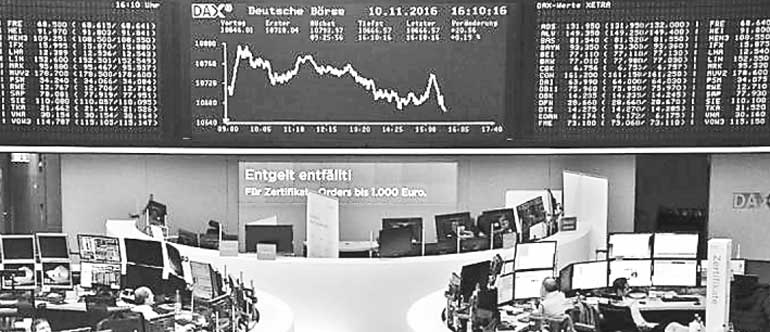Monday Feb 23, 2026
Monday Feb 23, 2026
Saturday, 12 November 2016 00:55 - - {{hitsCtrl.values.hits}}
Reuters: Asian shares stumbled on Friday and emerging market currencies skidded as investors feared higher interest rates under incoming President Donald Trump will spark capital outflows from the region.
MSCI’s broadest index of Asia-Pacific shares outside Japan fell 1.4% as US bond yields continued to soar on views that Trump’s spending plans will push up inflation, possibly triggering more aggressive rate hikes by the Federal Reserve.
Emerging markets bore the brunt of selling, with Indonesian shares slumping 3% while the rupiah currency IDR= fell more than 2.5% to 4-1/2-month lows.
The Mexico peso MXN=D2, sank to near its record low hit after Trump’s surprise sweep to power.
Japan’s Nikkei bucked the trend, rising more than 1% to 6-1/2-month highs the yen weakened against the firming dollar.
On Wall Street, the US S&P 500 Index .SPX rose 0.2% while the Dow Jones industrial average jumped 1.2%, smashing through its previous record high set in August by almost 1%.
In contrast, the technology-heavy Nasdaq fell 0.8%, with Apple APPL.O dropping 2.8%, hit by fears that Trump’s immigration policy could prevent Silicon Valley from attracting talent from around the world as it does now.
“The market’s focus has shifted to Trump’s policy after the initial knee-jerk risk-off reaction. The markets think he is likely to protect the US domestic economy, especially the old economy,” said Koichi Yoshikawa, executive director of financial markets at Standard Chartered Bank.

“That explains why the Dow was up and the Nasdaq was weak,” he added.
The financial sector surged 3.7% to its highest since the 2008 global financial crisis, as Trump has sided with leading conservatives in calling for the repeal of the 2010 Dodd-Frank Financial Reform Act largely opposed by banks.
US bond markets have also seen dramatic moves since Trump’s victory, with the 10-year US Treasury yield hitting their highest levels in 10 months.
Expectations that his policy stance - from protectionism and fiscal expansion – will boost inflation have been driving the surge in US yields.
“You have fiscal policy that will widen the deficit by trillions of dollars in a decade, and if there’s a 20% tariff on imports from China, that alone would boost inflation by one percentage point,” said Tomoaki Shishido, fixed income analyst at Nomura Securities.
The 10-year US yield US10YT=RR rose to 2.15%, almost 30 basis points, or 0.30 percentage point, above its levels around 1.86% just before the US election on Tuesday.
The 30-year yield US30YT=RR rose 38 basis points, posting its biggest weekly jump since 2009 before a US market holiday on Friday.
Soaring US yields have been a boon to dollar bulls. The euro dipped to $ 1.0908 EUR=, compared to $ 1.1025 before the US elections.
The dollar strengthened sharply against the yen, which has traditionally a strong inverse correlation with US yields because higher US yields encourage Japanese investors to buy more US debt.
The dollar rose to as high as 106.95 yen JPY=, its highest since late July, compared to around 105.15 yen before the elections. It eased back to 106.38 yen on Friday.
However, emerging market currencies were hammered by concerns investors could pull back their funds out of higher-yielding emerging assets and move them back to the US.
Apart from the Indonesian rupiah, the Mexico peso has fallen 7.5% so far this week, hit by Trump’s threat to scrap the country’s key free trade agreement with the United States and build a massive wall along the border.
The Brazilian real BRL= shed 5% on Thursday to a five-month low, while its benchmark Bovespa stock index slumped 3.3%.
The South Korean won KRW= fell to its lowest level in more than four months on the dollar’s strength and concerns about Trump’s foreign policy and his commitment to security in East Asia.
Markets are expecting the US Federal Reserve to go ahead with a rate hike in December after US markets quickly stabilised from the initial Trump election shock.
The money market futures FFZ6 FFF7 are pricing in about 75% chance of a rate hike.
In a remarkable shift of sentiment, the market is also now starting to price in a chance of a rate hike by the European Central Bank for the first time since 2011.
Elsewhere, oil prices eased as the market looked to whether OPEC will decide later this month to cut production to address long-running over supply concerns.
US crude futures CLc1 fell 0.6% to $ 44.41 per barrel.